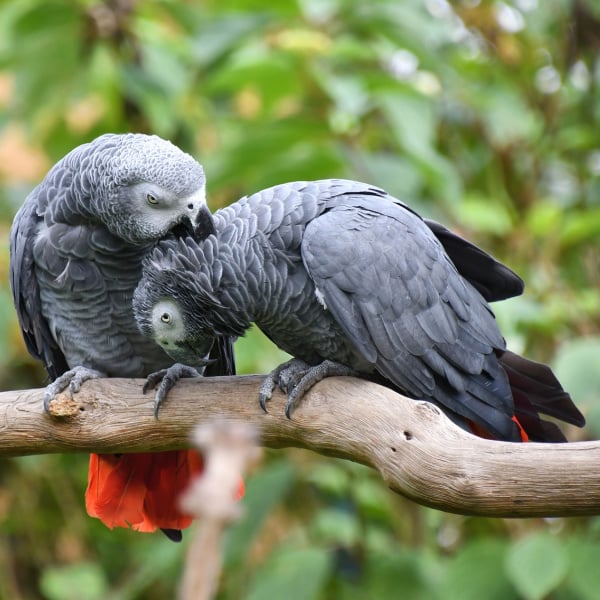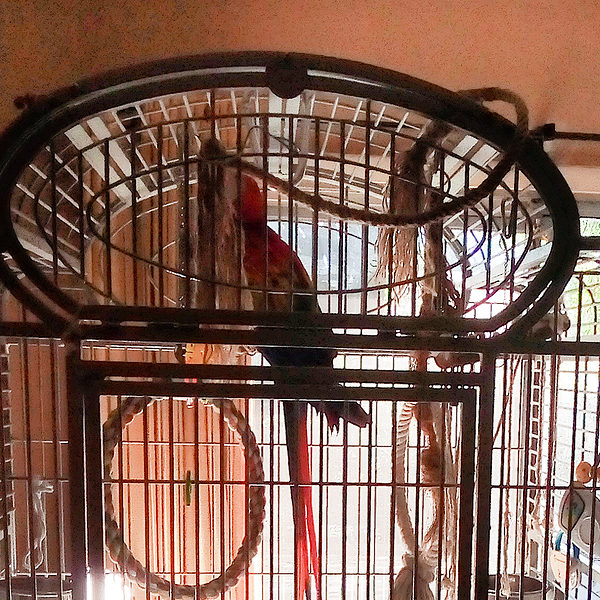Last Updated on by Mitch Rezman
My husband and I have two 14-year-old African grey parrots.
We bought them from a pet store that sold only parrots when they were chicks.
They seem very healthy – have good appetites, play, scream, etc.
However, one of the birds has been losing her feathers and it is getting worse.
We took them both to an avian vet who told us the bird whose feathers are falling out had a vitamin deficiency so we have been stepping up both their pellets and we are giving them avian vitamins (as suggested by the vet).
Nothing has worked and I am worried she is going to lose all or most of her feathers.
Can you suggest something we might do so this doesn’t happen.
The vet told us that we can’t do anything but I want to do everything possible to avoid feather loss.
Any advice you can provide is greatly appreciated. Sincerely, Rita P
Dear Rita
Did you get your birds when they were babies from that store?
They are now 14 and one is losing feathers? Is the bird pulling them out or are they not growing back in after they are molted out?
Has the bird been tested for Psittacine beak and feather disease (PBFD)?
If you are feeding primarily pellets you don’t need added vitamins, too much can be toxic. Has it been determined what vitamin is deficient?
Thank you very much for your response.
Yes, we bought our parrots from the store when they were chicks and have had them since then.
Although we have been feeding them pellets, we were also giving them other types of food and the vet suggested that we change their diet to include more pellets. We told him that we were also giving them vitamins and he didn’t comment that we shouldn’t. I believe he said the deficiency was vitamin A.
Neither bird does any type of feather plucking and I haven’t really paid attention to when they molt.
I have not had our bird tested for that horrible disease; I assumed the vet would have suggested that we do this if he felt this might be the cause of the feather loss.
Because our bird is still behaving the same, eating well, playing, talking, flying, I can’t see her being sick.
I am going to follow up with my vet on this, although I know there is nothing I can really do if she has this disease.
Thank you very much.
Sincerely,
Rita
Dear Rita
How long have you noticed that feathers are missing and not being replaced?
And the vet says they are not a result of being pulled out?
I had a cockatoo that would pull out her cage mates feathers. Very annoying.
Are there patches of bare areas? Are there down feathers showing? Or bare skin?
A diet of seeds and pellets would generally require additional vitamins, a completely pelleted diet would not.
I really don’t know the best way to resolve a Vitamin A deficiency other than adding avian vitamins to the food.
I would truly hope it is not PBFD which is contagious, were your birds ever boarded anywhere or socialized with other birds?
I am also not at all sure if it is a latent illness that can live within a bird for so long without it showing until now either.
That is a worse case scenario of course. I hope you can get to the bottom of this.
Dear Catherine,
Thank you so much for your advice.
To answer some of your questions, the feathers that are missing are primarily around my bird’s (her name is Chloe) throat. There is both bare skin and down feathers and I can see some of her shafts.
We give our birds a very varied diet that is primarily comprised of pellets and seeds but includes fruit, veggies, pasta, yogurt, cheese (the last 2 foods are very minimal because I know birds don’t have the capability to digest milk-based foods properly) basically a very small portion of the foods we are eating with the exception of avocados, chocolate and meat.
They pretty much eat anything we give them which I am thinking now might be a problem.
You can bet I hope Chloe does not have PBFD.
The other bird (Clara) looks perfectly normal. I first noticed Clo’s feathers were missing about 4 months ago and I took her to the vet about a month after I discovered this when I realized her feather loss was spreading.
Neither bird has had any contact with other parrots in years.
I am actually afraid to have Clo tested for PBFD (which I researched last night and learned that although Clo definitely does not have the acute version, she might have the chronic expression of the disease).
Thanks again for all your help and I will keep you posted.
Sincerely,
Rita
Dear Rita
Keep a close watch on if the other bird is actually over preening the bird missing the feathers. It does not sound like PBFD thankfully.
Catherine,
Thank you so much for your assistance and support.
BTW: Is there a pellet and/or seed mixtures that you carry that you recommend to support excellent health?
These guys are very fussy when it comes to pellets (likely because they are used to more tasty food).
They like a nut blend mixture of pellets but won’t eat a fruit mixture.
Sincerely,
Rita
Hi Rita
As far as top quality ingredients I really like the Goldenfeast parrot food line.
Goldenfeast does not add vitamins so you would add your own which allows you to have total control.
Their pellets are unique in that they also have no added vitamins but that they also have NO corn.
99% of all pellets on the market, the first ingredient is corn. Corn is a filler with poor nutrition.
Goldn’Obles have no corn. The first ingredient is quinoa. Take a look at the great ingredients in these and all of the Goldenfeast foods.
We are especially happy with Nekton Vitamins. They should have everything that you might like to add.
Nekton-S Multi Vitamin is a very good multi-vitamin.
Nekton Bio would be fuel for the feathers.
I hope this helps.
Catherine
Rita
A timer set for 12 hours on and 12 hours off daily with a good full-spectrum bulb above the cage top (just out of reach of the birds) will help keep them evenly keeled all year round.
It is a strong possibility that one or both of them are feeling frustrated and you can see it in the feather picking pattern in the one.
By the way, the area is likely in the front and up and around the neck where it can reach them. Is this correct?
So, we have a very good solution for that. Totally free and completely safe.
This also works for broody and egg-laying females and even works for horny male birds who are just a little too testy to handle anymore.
You would have your full spectrum light set up above your birds cage and instead of turning it off after 12 hours you would leave it on for 72 hours. That is 3 days and nights with the lights on.
Instead of covering their whole cage at night you will wrap around the cage and leave the top exposed to the light.
If you have a play top cage with a tray, get rid of the tray.
If you must have something up there get a clear plastic cutting board or something, but no more solid top.
What this light treatment does is reset the birds circadian rhythms.
Then when DST comes, it is then 7 to 7 without touching the timer.
Please mull this all over and let me know your thoughts.
Catherine
Author Profile
Latest entries
 Feeding Exotic BirdsDecember 29, 2025How to Switch or Convert Your Bird From Seeds to Pellets: Real-Life Case Studies and Practical Guidance
Feeding Exotic BirdsDecember 29, 2025How to Switch or Convert Your Bird From Seeds to Pellets: Real-Life Case Studies and Practical Guidance Feeding Exotic BirdsDecember 16, 2025A Practical, Budget-Smart Guide to Feeding Birds Well
Feeding Exotic BirdsDecember 16, 2025A Practical, Budget-Smart Guide to Feeding Birds Well Bird EnviornmentsDecember 7, 2025Understanding Budgie Cage Bar Orientation: Myths, Realities & Practical Solutions for Vertical-Bar Bird Cages
Bird EnviornmentsDecember 7, 2025Understanding Budgie Cage Bar Orientation: Myths, Realities & Practical Solutions for Vertical-Bar Bird Cages Feeding Exotic BirdsDecember 5, 2025How Dr. T.J. Lafeber Rewrote the Future of Pet Bird Nutrition
Feeding Exotic BirdsDecember 5, 2025How Dr. T.J. Lafeber Rewrote the Future of Pet Bird Nutrition



